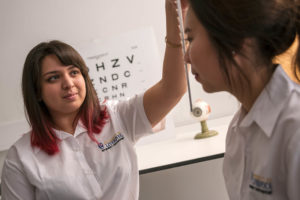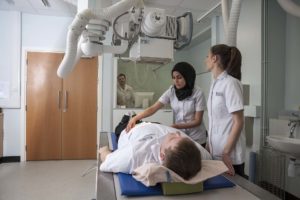About this course
Step into the forefront of healthcare innovation with our MSc in Data Science and Analytics for Health. Data science is revolutionising healthcare by enabling data-driven decision-making to improve healthcare outcomes. We are able to use Machine learning models to analyse healthcare data to predict diseases before symptoms appear, as well as use AI tools to enhance medical images, allowing greater accuracy and speeding up disease identification. This programme will equip you with the technical and analytical skills to become a key contributor to the digital revolution in healthcare.
Introduction
Data science is transforming the healthcare sector where large amounts of health data has the potential to revolutionise health care interventions. With the rise of electronic health records, wearable technology and AI driven diagnostics, healthcare now generates vast amounts of data. Effectively analysing this data allows for earlier disease detection, personalised treatment plans and more efficient resource allocation.
Predictive analytics can help identify at risk populations, while machine learning models assist in the diagnosis of conditions with greater accuracy. Data Science also plays a crucial role in public health by tracking disease outbreaks, guiding policy decisions and improving global health interventions.
This programme blends core principles of computer science with advanced statistical analysis and data visualisation techniques to discover how health data science can enhance our understanding of disease and healthcare.
The structure of the MSc has significant flexibility allowing students to follow their personal interests and specialise in, for example, prediction modelling, artificial intelligence and machine learning, and clinical trials.
This MSc also has strong links to the Civic Health Innovation Labs (CHIL), an internationally recognised, multi and trans-disciplinary research centre based at The University of Liverpool. The centre brings together leading experts from academia, the NHS, local government, charities and industry to develop a new model for progressive data uses and responsible AI in civil society, fuelling innovations for health, society and economic advancement for the Liverpool city region.
CHIL provides dissertation research projects for students, focusing on areas such as healthcare data analytics, digital health solutions, public health informatics, and the application of technology in community health initiatives. These projects offer students the opportunity to work on cutting-edge research, contributing to meaningful advancements in global health.
The programme opens up a multitude of career opportunities globally, including in the health sector, industry, and academia. In the UK alone, demand for data scientists and data engineers has more than tripled over recent years, increasing by 231%, which translates to approximately 52,000 new jobs.
Who is this course for?
This master’s programme is suitable for you if you hold a 2.2 degree from a UK University (or equivalent). Your first degree could be in any subject, as long as you are able to evidence previous experience of quantitative skills (for example, at least one module in your degree in statistics, computer science or mathematics).
This programme is also open to intercalating students on clinical programmes.
For students who do not have any previous experience or quantitative training, please see our MSc Data Science for Health (Conversion), which is specifically designed for students who are wishing to move into the field of data science, irrespective of their background and previous training.
For students who have a particular interest in undertaking research, we also have an MRes in Data Science for Health. This programme is designed for students who prefer more intensive research training, with a major independent research project at its core, making it ideal for those considering future PhD study, academic careers, or those wanting to specialise in a specific research topic.










